The homeless have always featured in the stories Londoners tell. From doomed Jo in Bleak House, to John Healy’s mid-century memoir The Grass Arena, to the early 70s cult BBC TV movie Edna The Inebriate Woman, the city’s vagrants have worried and perplexed their more fortunate fellow citizens.
Most recently, Alan Bennett’s 1999 play The Lady In The Van, which told the story of the playwright’s 15-year friendship with a homeless woman – a Miss Shepherd – who moved into a van in his Primrose Hill garden, has been adapted for a “cosily enjoyable” movie released this winter.
 Miss Naysmith
Miss Naysmith
Further to the west, Miss Shepherd had a counterpart with a less cosy story. Anne Naysmith lived in Chiswick, an affluent suburb. Anne was well-educated, solvent and hardcore homeless. For 25 years, she lived in a car opposite her former flat. Then, for the final 13 years of her life, she slept rough and maintained a garden at the edge of a nearby car park.
She became an unmistakable figure, walking slowly, hunched over her trolley, her shoeless feet wrapped in layer upon layer of plastic bags and newspapers, up and down the Chiswick High Road. Along the way, she stood her ground against many enemies, including local hooligans, cyclists, the council and the transport authority.
As London’s super-rich make the city their playground, pushing the rest of us further and further to its social – and physical – margins, I think it’s becoming more and more important to remember stories like Miss Naysmith’s. She’s an example of somebody who refused to be pushed out. She lived on nobody else’s terms but her own.
Here is Miss Naysmith’s story, in the words of the people who lived alongside her.
Part 1: 1937-1976
“I’ve had so many hardships in my life, so many disappointments and failures. You wouldn’t call me one of life’s successes. But life goes on. You do what you can.” – Anne Naysmith
M: It is a long and sad story.
A: She was in my school in Dukes Road, Chiswick, before she left for the Academy. An independent lovely girl.
R: One day many years ago I heard her singing like an angel in the street. It was obvious she was a talented musician.
Anne Smith was born in 1937. A piano prodigy, she won a place at the Royal Academy of Music, and then became a successful music teacher. She lived in rented rooms at No 22 Prebend Gardens, a curved road of solid two-storey properties.
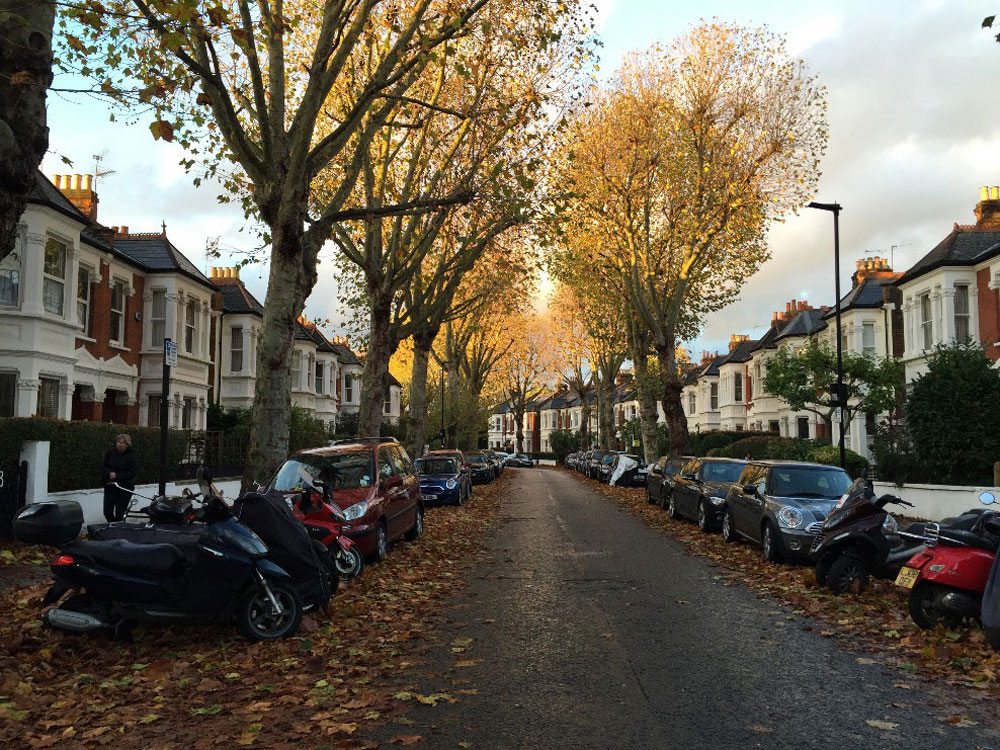 Prebend Gardens
Prebend Gardens
In 1967, she took to the stage at the Wigmore Hall for a solo recital. The programme was daring, including Rachmaninov’s ultra-complex Op. 23 preludes. And the reviews were good, with one critic writing of her Rachmaninov: ‘She blossomed most fully as an artist and drew some of the warmest and richest sonorities from her piano’. She bought a car, a Ford Consul. Performances at other venues in London followed.
Then, as so often with musical careers, things went wrong. The engagements dried up. By the mid-1970s, Miss Smith had also given up teaching. Her interests, it seemed, lay elsewhere.
M: She wore suits and had real blonde hair in a chignon, a proper leather bag too. She wore neat little court shoes. She had a deep musical knowledge. She was very assertive at that time, though never aggressive.
J: She was on Chiswick High Road in the 1970s campaigning on numerous issues of value to mankind.
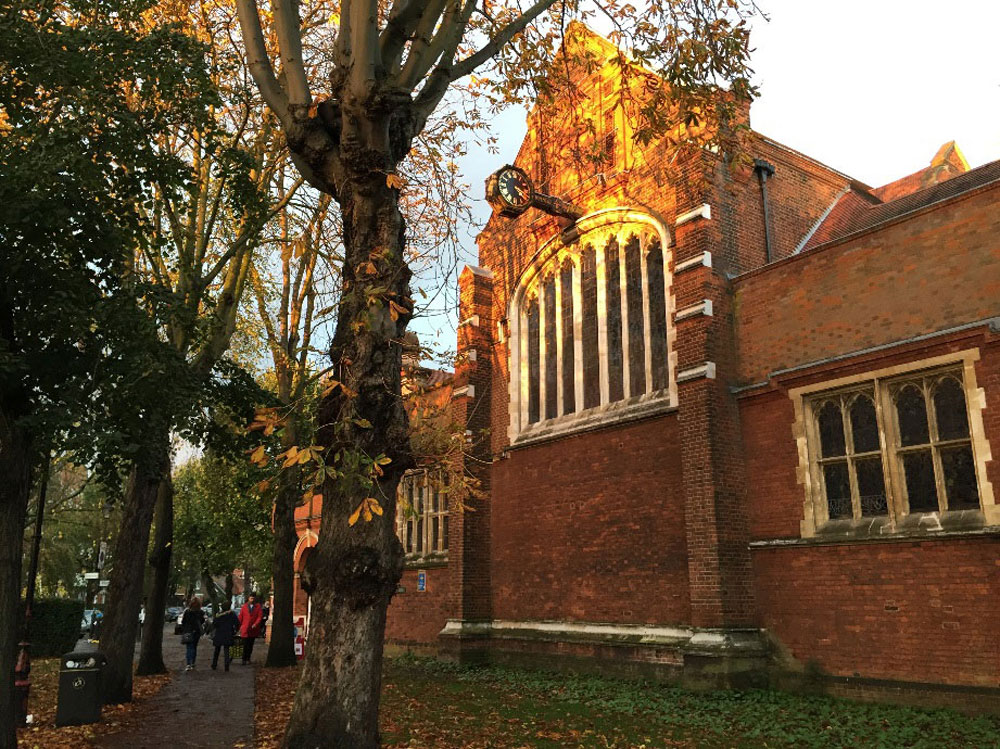 St Nicholas’ Church
St Nicholas’ Church
A: For many years she was a regular at Sunday evensong at St Nicholas’ Church, and usually had something challenging to say afterwards about biblical interpretation or the content of the service.
L: Miss Smith, as I knew her, and I, coincided most Saturdays for evening prayer. After which, with the then Vicar, we often put the world to rights.
C: She tried to start a chess club in Chiswick Town Hall but was knocked back by bureaucracy and child protection requirements. She was most indignant that being a graduate of the Royal Academy of Music was not sufficient proof of her integrity.
I: I don’t think everyone is sure about what happened to her. It wasn’t something one ever approached her directly about. It was her business. The reasons for her breakdown will remain a mystery.
With no income from teaching, paying the rent became a problem for Miss Smith. She may also have suffered the breakdown of a relationship with a 6ft 5in choral singer. She was asked to leave by the landlord – and then took to sleeping in her car, parked just outside the flat in Prebend Gardens. Years later, Miss Smith underwent a name change: she was now Miss Naysmith – a negation of her previous identity, and an erasure of her family.
L: She felt her mother was too demanding. She was desperate for her daughter to be a major pianist, but Anne could not take the pressure and decided to leave home.
R: She had a piano and her mother wanted her to be a rich and famous concert pianist but although she loved her piano there came a point when she realised that she couldn’t fulfil her mother’s ambitions. She was aware that most of her pupils were there because their parents wanted them to be and their hearts weren’t really in it. Her father left when she was young, she had fallen out with her mother and she spoke briefly of a failed relationship.
B: Miss Naysmith’s state of mind was disturbed by a failed romance. The boyfriend had moved his new girlfriend into the house and she wanted to make a point.
R: She was finding it difficult to make ends meet and one day bailiffs took her piano away. It was the worst thing that could have happened. It was her one true friend which required nothing from her and on which she could pour out her feelings. Never again would she be involved in close relationships or conform to what other people thought she should be doing or how she should be.
M: She was a regular at the reference library, and I remember her talking about her landlord and the legal problems she was having. She lost her court battle with the landlord.
C: The landlord kicked her out because her mum and dad were gone and the flat was in their name. I don’t believe it was unrequited love or anything like that.
A: She was a sitting tenant in a house in Prebend Gardens that a friend of my dad’s bought in 1979. Her behaviour was appalling and she daubed obscenities all over the house. He had her thrown out legally.
Part 2: 1976-2002
“Anything really good and beautiful tends to be destroyed or stolen.” – Anne Naysmith
Now living in the Ford Consul, Anne Naysmith began to build a daily routine. Trips up and down the High Road: to the library, the Town Hall. Indulging her varied interests: music, cricket, chess. By night, she bedded down in the car, having made a nest with pieces of newspaper. She stored her food in a rubbish bin next to one of the houses, carefully labelled so it wouldn’t be cleared away. And she attracted strong support from her neighbours.
K: She was a woman of principle. She left her house on principle. She moved into her car on principle.
M: From her point of view, it was perfectly reasonable to live in her car, because it was just in front of the old flat that she had fought to keep.
R: The car was beautifully and carefully painted with flowers, curling tendrils, birds, butterflies and poems. A wonderful hippy car.
 The Ford Consul
The Ford Consul
M: Once she was in the car, her clothes changed almost immediately. The leather shoes were gone and she started wearing layers of plastic bags on her feet. The bag was starting to be covered in slogans. She was strongly ‘eco’ in outlook and you could see that on the bag.
D: I first crossed paths with her at the age of eight – my seven-year-old brother and I offered her some shoes. She replied, politely: ‘I don’t wear leather.’
C: I first met her in 1983, she was hobbling around in bandaged feet – there were newspapers wrapped around her feet. I wanted to get her shoes. And she rejected them right away. She said, ‘I don’t need shoes – I need someone to talk to.’
N: I witnessed a good Samaritan hand her a bag, this was promptly thrown to the floor spilling the contents, which appeared to be a pair of Ugg type boots, she started shouting ‘pick them up’ over and over.
R: I was fascinated by her walking along the middle of the road, holding a kettle, early every morning in defiance of the traffic. One morning there were five geese waddling along in a line behind her with the buses stopping whilst the retinue moved along.
D: Ever since 1981, when I first played weekend cricket in Chiswick House, Miss Naysmith would invariably turn up early into the game and sit with her back to the large tree which was on the boundary edge near the pavilion. From there she would produce some paper and proceed to score the match, staying for hours and refusing, always, offers of tea and sandwiches. How she never suffered serious injury from a cricket ball I will never know.
A: I remember when she lived in the Consul in Prebend Gardens as I used to pass her every day on my way to work. If I was on my bicycle, she would scream abuse; if I was on foot, she was a delight.
N: Normally she kept herself to herself apart from when someone cycled on the pavement or a smoker discarded their butt on the floor, then the offender was given a cold hard reality check.
C: Our boys used to call her ‘the naughty lady’ because she once threw a bread roll at my head as we cycled past.
S: She liked to throw bread at cyclists and was a very good shot. I would not approach her without some body armour on.
C: I learned never to initiate the conversation or indeed offer her so much as a boiled sweet, although she was always offering to share her tea or snacks.
G: She wanted everyone to stick to the rules. I remember one very hot day in the reference library. Someone there had asked to drink some water, but she didn’t like it because it wasn’t allowed. So she belted the librarian with her umbrella, so hard she screamed like she was being murdered!
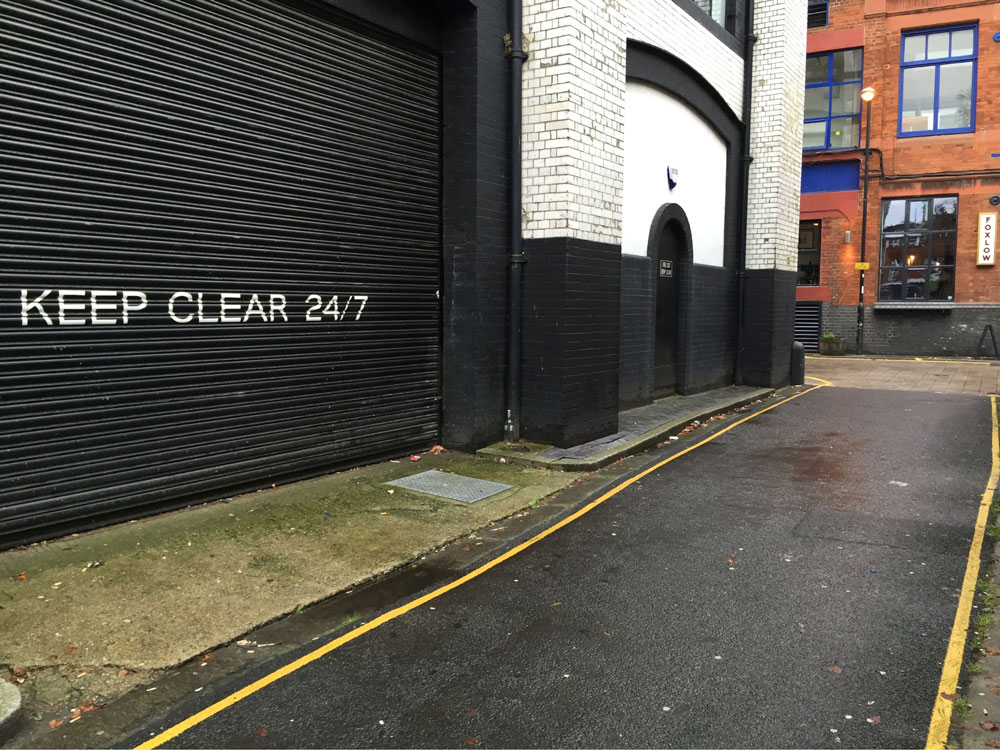 Off the High Road
Off the High Road
The local authorities tried over the years to find a solution. She was offered a number of flats in Chiswick. She responded that if she could not move back into her old flat, she wasn’t interested in moving anywhere. And the Prebend Gardens residents were still, mostly, on her side.
S: Nobody minded her living here. We didn’t care. It wasn’t unsafe. We paid her road tax sometimes. We clubbed together to take care of her. A horrible couple applied for an order to get the car removed. They said it didn’t look nice. They were worried about the value of their house.
R: She had lived very happily with the neighbours and one of them had given her their address for collecting her post. The yuppies had a lawyer and it was the lack of a toilet that finally enforced her car removal.
A: One day we discovered her car windscreen had been smashed in. We always suspected it was the council trying to force her to move on. She refused our offers to replace it and covered it with cardboard and plastic. While she was out one day the guys in the car repair shop under the arches fitted a new one for her. I don’t think she ever knew who did it!
One day in 2002, the council and police arrived to remove the Consul. Miss Naysmith was away at the time. A neighbour clambered on to the bonnet of the car while two others leaned on it. They gave up their resistance when threatened with arrest. And so Miss Naysmith’s final home was towed away.
C: After she was put out of the car, the people on the street clubbed together and they got a new one for her, it was a red Mercedes. I remember passing it and thinking I wanted to be homeless too in a minute! But it didn’t last. She was being tormented by the youth in the area. The Mercedes was broken up by them in the end and she didn’t stay in that car. She didn’t like young men in general because they were the ones that tormented her.
L: After somebody had fired her car I went along with some blankets for her as it was rather cold, I was sent off with a very big flea in my ear, she was so insulted, and told me she did not need help of any kind.
C: The people who did that to her – the couple who complained to the council and got her put out – eventually moved out themselves because they broke up. The other people in the street thought it was quite funny.
Part 3: 2002-2012
“I made a little square in the corner of the asphalt to do my cooking. Every time I cooked the fire would melt away a bit more asphalt and, little by little, I chipped it away.” – Anne Naysmith
As a woman of routine, Miss Naysmith found a new routine. She slept outside a language school around the corner from her car park garden. She washed in public toilets, or at a local doctor’s surgery. She cleaned her clothes with a petrol station hosepipe. Each evening Miss Naysmith made a fire in her underpass garden. She grew vegetables and plants, and tended to the fruit trees against the garden’s wall. The slogan-covered bag was gone: she now had a four-wheeled trolley, borne in front of her on her long walks.
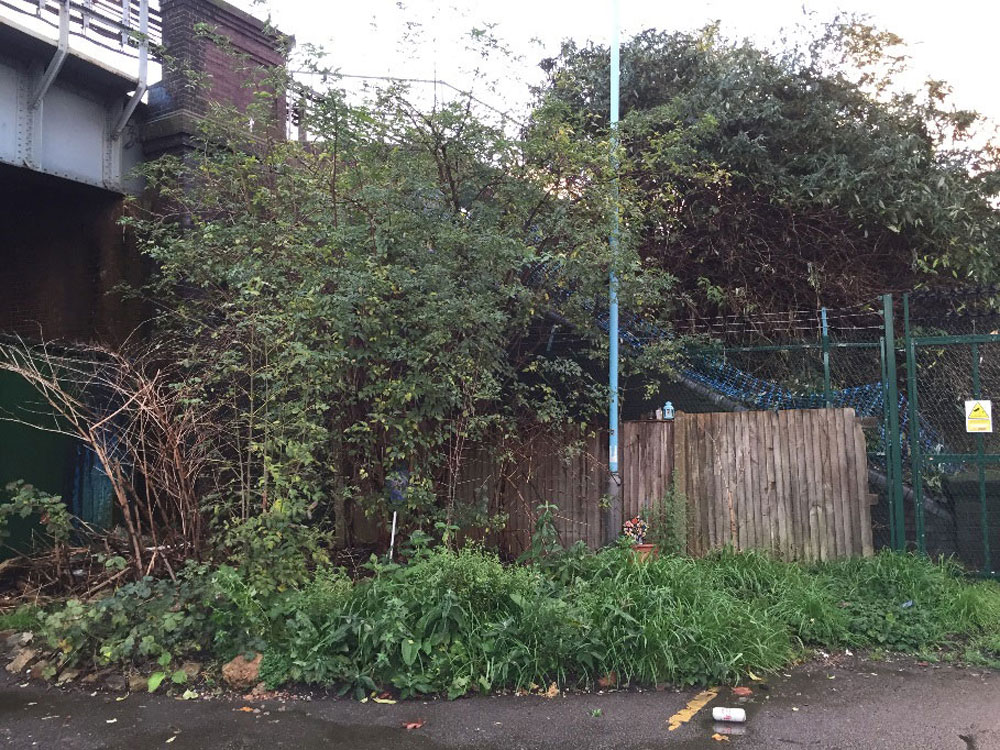 Miss Naysmith’s garden
Miss Naysmith’s garden
R: I lived right next door. Miss Naismith used to sit, cook, do her thing. Every morning, whatever the weather, she would always look and smile and say ‘good morning’.
P: She was rather obsessive about strange things. She thought flowers and bushes have more of a life than we think.
S: One of her idiosyncrasies was a dislike of drawing pins in trees.
R: I found her ripping down lost cat photos which had been pinned to the trees. A lady gently remonstrated with her and promptly received a foul-mouthed tirade for her pains.
J: I visited her round her little fire as she brewed up her lemon and sugar drink which she said was cleansing. We talked of many things and ecology was her passion.
S: She once told me once how cabbage roots, when cooked, tasted like asparagus! I was amazed at her resourcefulness.
C: She was always advising me to put butter up my nose to ward off hay fever. She had a great faith in the healing properties of butter and after all, somehow managed to survive on the streets for half a century. I confess that I never put it to the test though.
 Miss Naysmith’s fireplace
Miss Naysmith’s fireplace
R: She used to attend Chiswick Recycling Action Group meetings at the Town Hall and one evening she pushed her trolley along Town Hall Avenue, which was lined ŵith filming vehicles, floodlights and a cast of actors in period costume. The astonished cast and crew stood there watching an extraordinary person wearing plastic bags on her feet and bent double over a shopping trolley, refusing any help with getting it up the steps. She went into the meeting room, put a notebook on the table and sat down. She produced a detailed survey of every residence in her area, showing what, if anything, was being recycled and percentages worked out. At the end of the meeting, she made her way back along Town Hall Avenue. The film crew were packing up.
Outside of Chiswick and into the city, Miss Naysmith had a few preferred haunts: master classes at her Academy; St James’ Piccadilly, home of lunchtime classical concerts; the Albert Hall, where she often spoke to the summer queues for Proms tickets; the Barbican music library; local courts, where she listened in on cases from the public gallery – and was reminded of her own, failed, legal case.
J: In the 80s I used to see her walking nearly on a daily basis down towards Piccadilly from Green Park. Sometimes taking a little rest in the courtyard of St James’s Church.
L: Even in the 90s, I would spot her walking down past St James’s Church quite regularly. I used to wonder if she had walked all the way. Miss Naysmith obviously had a destination.
B: I saw her shuffling along the street outside my office in the City. She wore a flowing black cape and her plastic bag homemade shoes. She shuffled past me… I turned to see her pass, too late to say hello as the next moment she was a hundred icy yards away from me. Did I see a ghost? It was a very cold night. She was so far away from home.
Part 4: 2012-2015
“I started screaming: ‘Police, police!’ I couldn’t understand what had happened. I thought it was beautiful. Why would anyone do something like that? I’ll just have to start again. I won’t give in and I’m not going to move away. It’s wanton, wicked vandalism. This was a lovely patch of garden. I was doing nobody any harm.” – Anne Naysmith
After years of growing the garden, it was destroyed in a day. The overpass that shaded her patch of land is for the District and Piccadilly tube lines, owned by Transport for London. And, one morning, they cut the garden down in order to rebuild a security fence next to the line. The cherry and plum trees were gone. Miss Naysmith returned to the scene and threatened suicide. Afterwards, the local authorities attempted to explain themselves.
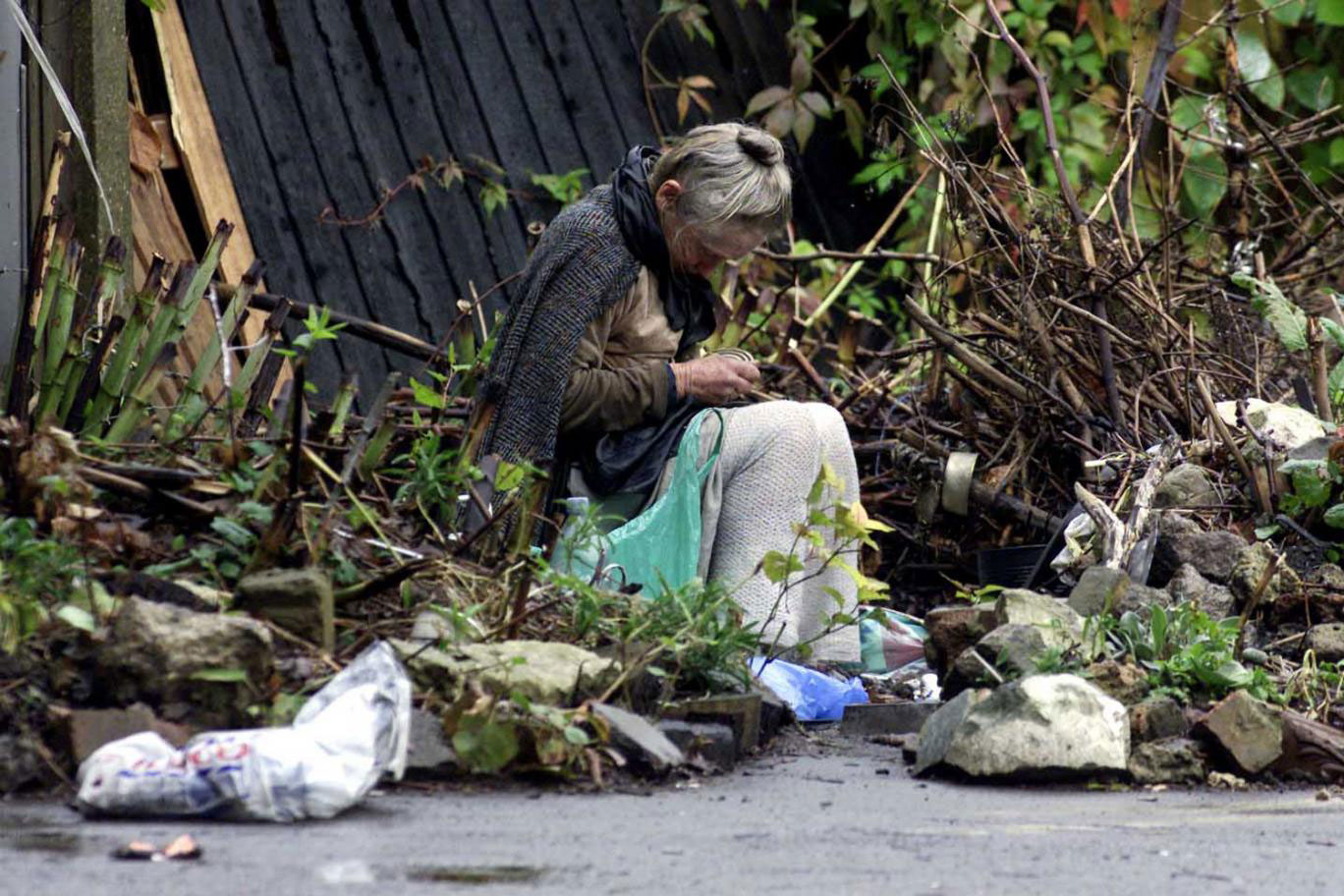 Miss Naysmith, 2012
Miss Naysmith, 2012
T: The contractors were not aware of the special significance this piece of land had for Miss Naysmith and their primary concern was dealing with a safety critical issue. Obviously we very much regret the distress caused to Miss Naysmith.
C: Within a couple of hours we went down to the car park to meet Miss Naysmith, apologise and find out what we could do to rectify the damage. Miss Naysmith accepted our apology and that the damage was accidental. She said she would think about our offer to go with her to buy replacement plants at any time.
In the final three years of her life, Miss Naysmith’s physical health declined. After so many years of refusing all help, and so many miles of shoeless walking, she gave way – a little. The end came in February 2015, in the middle of the High Road she had paced up and down so many times.
G: The councillors were very good. Towards the end, she at last told them that it would be useful if she could have a little bit of money, so she had her pension. And she got a bus pass, too. It was so difficult for her to walk – her feet were in a bad way.
S: I last saw her a couple of years ago when I was in Chiswick outside Sainsbury’s and she was screaming. It sounded like she was crying, it was a very high pitched screeching noise she was making.
M: She was an old woman with a hunchback walking up and down with a push trolley and big green bags, extremely slowly, shrieking and howling like a wolf, in quite a horrifying way.
C: By the end she was totally demented. She used to take the bus up to the centre of town. When she got off on the High Road, she screamed at everyone to get out of the way.
R: I saw her for the last time outside Campbell’s pharmacy. She was in Chiswick Town Hall the previous Wednesday evening when we had a chess match – sheltering from the cold, no doubt. She sat on the stairs, fiercely making notes on scraps of paper.
B: I saw her walk into the road on a few occasions – and scaring drivers.
J: Miss Naysmith did not always take sufficient care to ensure it was safe to cross. On one occasion when my wife offered her help in crossing Prebend Gardens as she seemed entirely unaware of the fact that a vehicle was rapidly approaching her, she reacted extremely angrily towards my wife and refused the help.
L: I last saw her near the bus stop outside the church. She was walking with great difficulty. I said hello, but there was a strange look in her eyes. Was it despair or defiance? She indicated that she didn’t need any help so I smiled, nodded and walked on feeling uneasy and wondering how much longer she could keep on. The following night she was hit by a lorry.
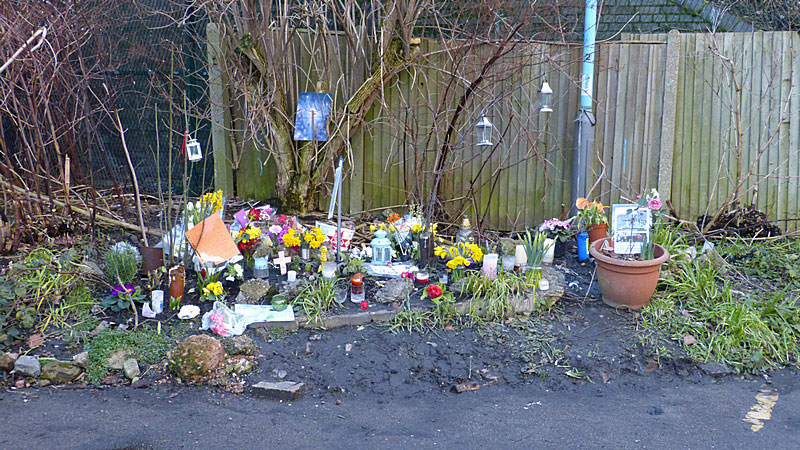 Tributes, February 2015
Tributes, February 2015
N: For the last 14 years that Speakeasy School has been at 24 Chiswick High Road, our doorway had been her bedroom most nights. She knew to come after 10 pm because of evening classes, and only on the odd occasion was she not packed up and gone for our opening at 9 am. We have lost our nightly security guard.
Over 500 people attended the funeral, held at St Nicholas’, where she worshipped each week. Miss Naysmith herself paid for it. Two condolence books were filled with tributes, and the underpass garden was carpeted with flowers and messages.
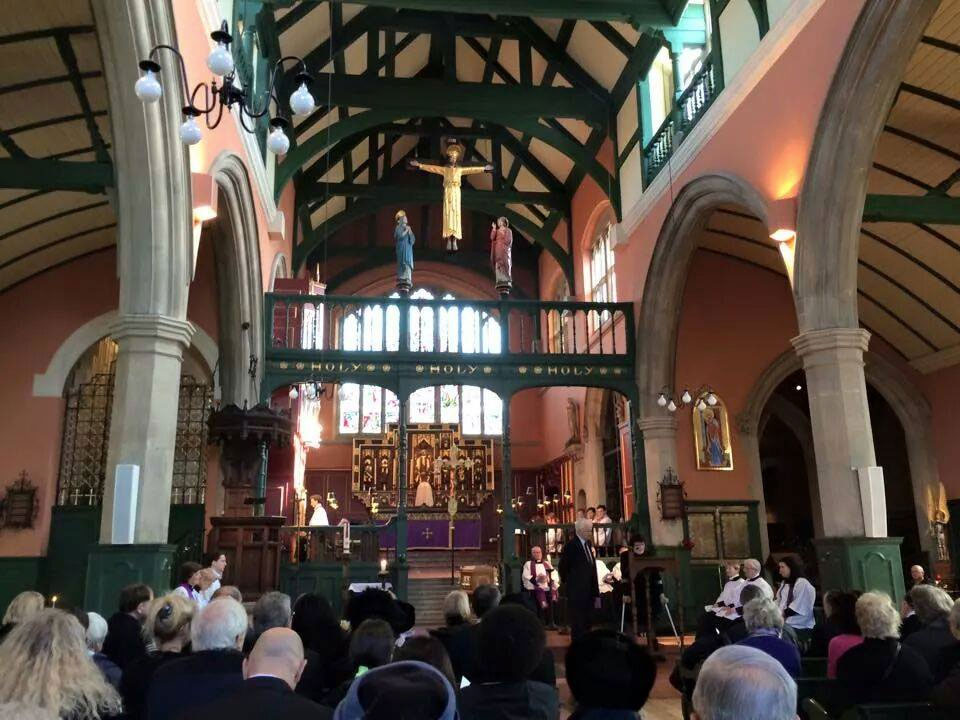 Memorial service
Memorial service
B: Sometimes people are held in high esteem because of their job or profession. Some, like Anne, are respected because they are true to themselves. She had dignity, she was her own woman. She didn’t ask questions, she had the answers.
L: I can’t believe that she’s gone in this way. I’d always envisaged we’d find her surrounded by flowers with the sun on her face.
B: I hope she rests in peace – and there are no cyclists in heaven.
S: She lived her life exactly the way she chose – and for that alone… ROUND OF APPLAUSE!
At the end of 2015, the space Miss Naysmith painstakingly carved out for herself – her private corner of greenery amid the concrete and brick, and the trains rattling overhead – remains.
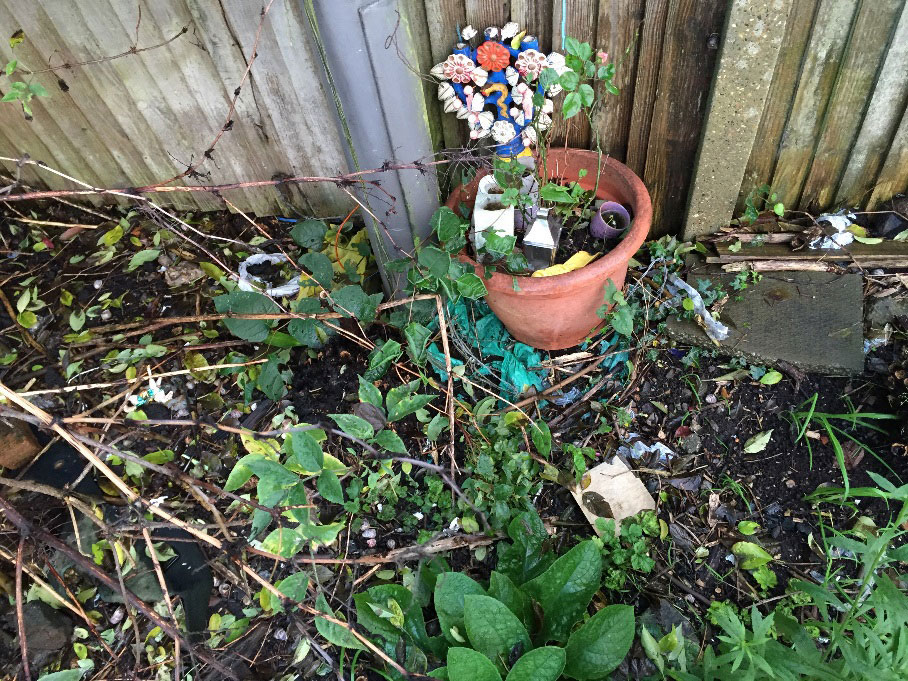 Miss Naysmith’s garden, November 2015
Miss Naysmith’s garden, November 2015
Looking closer, there are a few traces of the years of care lavished on this small patch of ground. The outline of her stone fireplace; the stubby fruit trees; the pots, lanterns and cards – it’s impossible to tell which of these were collected by Miss Naysmith, and which were left in tribute after her death.
The local council plans to plant a tree in her memory. The small garden will continue to grow – as will the vast, though not entirely uncaring, city that surrounds it.
A note on sourcing
This article is compiled from author interviews with Chiswick residents, forum and social media posts, along with the extensive news coverage Miss Naysmith attracted over the years: sources are the BBC, Guardian, Daily Mail, chiswickw4.com, Independent, Times and Chiswick Buzz. Some quotes have been merged and edited for clarity or to remove personal details. Image sources Glenn Copus/Evening Standard, Facebook, author’s own.
With thanks to the local history archives at Chiswick Library.
A version of this article originally appeared in Issue 2 of Novelty Magazine.